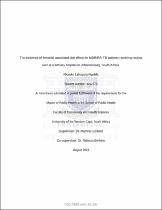| dc.contributor.advisor | Lembani, Martina | |
| dc.contributor.author | Ngolele, Nkateko Lebogang | |
| dc.date.accessioned | 2023-08-15T08:08:39Z | |
| dc.date.available | 2023-08-15T08:08:39Z | |
| dc.date.issued | 2023 | |
| dc.identifier.uri | http://hdl.handle.net/11394/10495 | |
| dc.description | >Magister Scientiae - MSc | en_US |
| dc.description.abstract | Background: Drug-resistant tuberculosis is currently considered an ongoing public health crisis and a health security threat. Several strategies for the management of MDR/RR- TB have been explored including the use of repurposed drugs like linezolid, fluoroquinolones, and the addition of new TB-specific medications like bedaquiline and delamanid. Linezolid has been extensively studied in the treatment of drug-resistant tuberculosis. Although linezolid is an important option for drug-resistant tuberculosis management, its prolonged use has been associated with treatment-limiting side effects including peripheral neuropathy, optic neuritis, myelosuppression including severe anaemia and gastrointestinal toxicity. | en_US |
| dc.language.iso | en | en_US |
| dc.publisher | University of the Western Cape | en_US |
| dc.subject | Linezolid | en_US |
| dc.subject | Adverse events | en_US |
| dc.subject | Drug resistant tuberculosis | en_US |
| dc.subject | South Africa | en_US |
| dc.subject | HIV co-infected | en_US |
| dc.title | The incidence of linezolid-associated side effects in MDR/RR-TB patients receiving routine care at a tertiary hospital in Johannesburg, South Africa | en_US |
| dc.rights.holder | University of the Western Cape | en_US |

